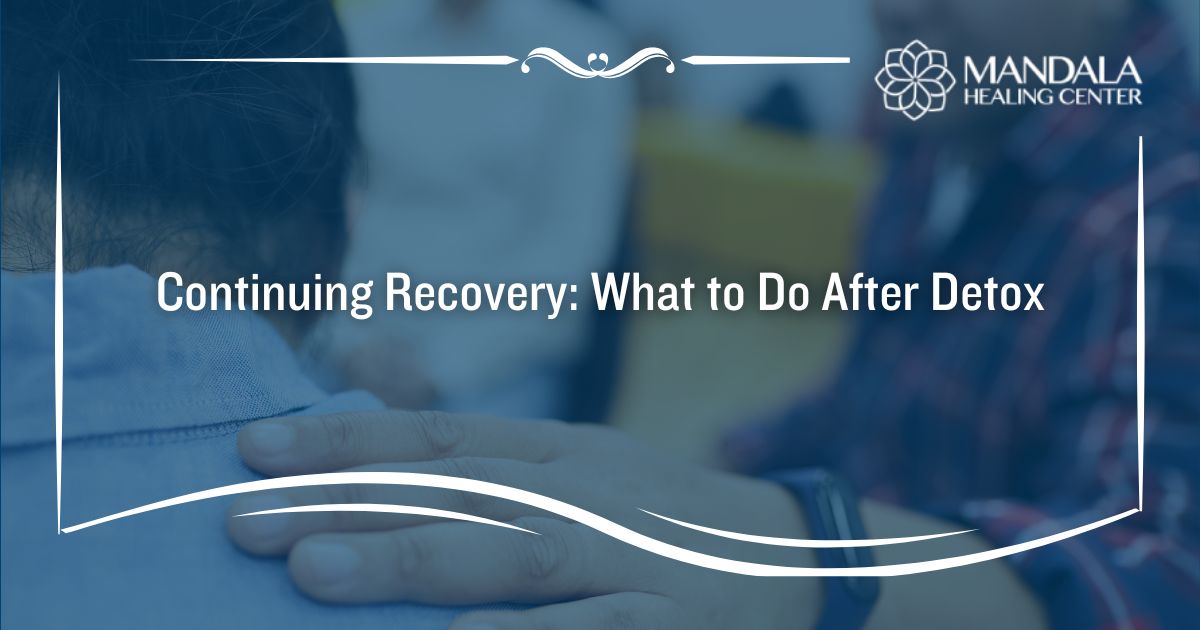If you struggle with drug and alcohol abuse, you are not alone. According to the Substance Abuse and Mental Health Services Administration (SAMHSA), 48.5 million people had a substance use disorder in 2023.[1]
The first step in overcoming addiction is attending a medical detox. During one of these programs, you’ll receive medical treatment and FDA-approved medications to help you overcome withdrawal symptoms and cravings. But what do you do when you finish detox?
While detox helps you recover from the physical aspect of addiction, you still need to overcome behavioral and psychological issues that could contribute to a relapse in the future if left unaddressed. This is why you should engage in a continuum of care that includes inpatient addiction treatment, an outpatient program, and sober living. Once you complete these programs, you can maintain your sobriety by engaging in regular sober support groups.
In this article, you will learn:
- Why should you enter inpatient rehab after detox?
- What is the importance of using an outpatient program to transition out of inpatient?
- Why should you reside in a sober living program after detox?
How to Stay Sober After Detox
Detox helps you overcome one of the biggest hurdles in addiction recovery: withdrawal. While this is a crucial step, your work is not done. You must overcome negative behavioral patterns, learn relapse prevention strategies, and recover from the root causes of your substance use disorder. The best way to achieve this is by attending a continuum of care that includes inpatient rehab, outpatient rehab, and sober living.
After completing detox, you should:
Attend an Inpatient Rehab
Inpatient treatment programs require you to live at the facility while you receive addiction care. This allows you extra time to develop some relapse prevention skills while you are shielded from outside triggers. You’ll participate in individual therapy, group counseling, holistic treatments, psychoeducational support groups, and relapse prevention planning during inpatient rehab.
When you attend an inpatient rehab program, you’ll also have access to specialized services. For example, if you need to recover from a co-occurring mental health condition, you can participate in dual diagnosis treatment. You can also opt to engage in medication-assisted treatment (MAT), which involves the use of medications to prevent cravings and relapse.
Inpatient treatment can last anywhere from 30 to 90 days, depending on your needs. They offer personalized care, which means the services you engage in will be specific to your goals for recovery.
Transition into an Outpatient Program
Once you graduate from an inpatient treatment center, you might want to consider entering an outpatient program. This type of addiction care allows you to continue receiving recovery services while you live in the comfort of your own home. It can ease the transition from living in an inpatient center to independence.
You’ll continue to engage in one-on-one therapy, group counseling, and relapse prevention planning during outpatient treatment. Having access to these services makes it easier for you to learn how to be independent while staying sober at the same time.
Consider Sober Living
You can enter sober living while you are attending outpatient or afterward. To explain, these programs provide you with a safe and substance-free environment to live in while you learn how to manage your recovery on your own. While they are not considered treatment programs, they do offer support that is necessary to the recovery journey.
Sober living programs have set rules to keep everyone safe and accountable. You might be expected to complete house chores, adhere to a nightly curfew, submit to randomized drug testing, find a job, and attend a certain number of support groups each week.
You can live in a sober living program for as long as you need to. Many people stay for a year and leave once they feel that they are ready to maintain their recovery independently.
Take Advantage of Sober Support Resources
Once you are tackling sobriety on your own, it’s time to take advantage of the sober support resources near you. This might involve seeing a therapist regularly, attending recovery support groups like 12-step programs, connecting with peers in recovery, and relying on your family and friends for support.
Participating in therapy and recovery support groups will keep you on track and increase your chances of long-term recovery by ensuring you have the guidance you need. If you are having a hard time, you’ll have professional and peer support, making it easier for you to overcome the issue you are facing.
Get Connected to a Top-Rated Inpatient Rehab Center
If you have recently completed a medical detox program and are wondering what to do next, you’ve come to the right place. At the Mandala Healing Center, we offer personalized and evidence-based inpatient care. Our program is perfect for people who are looking to further their recovery after finishing detox.
Contact the Mandala Healing Center today for more information on why you should attend our inpatient treatment center after completing detox.
References:
- The Substance Abuse and Mental Health Services Administration (SAMHSA): Highlights for the 2023 National Survey on Drug Use and Health
















